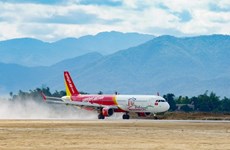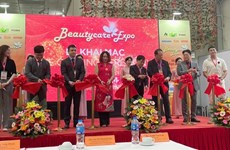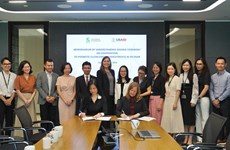Ben Tre seeks cooperation with ASEAN countries
 Participants at the seminar (Photo: VNA)
Participants at the seminar (Photo: VNA)Ben Tre (VNA) – The People’s Committee of the Mekong Delta province of Ben Tre on February 22 held a seminar to promote its potential in trade, investment, cultural exchange, and education to localities and investors from other ASEAN countries.
Chairman of the provincial People’s Committee Tran Ngoc Tam said that the Government of Vietnam is implementing a project to build a coastal road from Ho Chi Minh City to Tien Giang through Ben Tre and connecting with Tra Vinh, Soc Trang, Bac Lieu, and Ca Mau provinces. In the future, Ben Tre will be located on the axis linking the eastern coastal provinces of the Mekong Delta.
With a dense network of rivers and canals, and a diverse ecosystem, Ben Tre province has favourable conditions for the development of agriculture, aquaculture, marine economy, and renewable energy, especially wind power. In the next period, the province's orientation will develop toward the East.
Director of Ben Tre province’s Department of Planning and Investment Duong Van Phuc emphasized that the province has abundant and diverse sources of agricultural and aquatic materials.
Its agriculture is developed based on coconut trees, fruit trees, and fisheries. Over the years, the province has always strived to create an open business investment environment, creating a reliable destination for investors. In the period 2016-2020, Ben Tre always ranked in the top ten in the country in the Provincial Competitiveness Index (PCI) and the province belongs to the group of good and very good governance.
Indonesian Consul General in Ho Chi Minh City Agustaviano Sofjan said that one of the keys to defining smart cities and smart agriculture is being connected with technology and innovation is also an essential driving force for the development of smart cities and smart agriculture.
Truong Thi Nhi, Director of Forever Green Resort, said that Ben Tre has the potential to develop resorts for multicultural elderly people. The model of health care and rehabilitation is very necessary for the elderly, middle-aged women, and patients. It needs to be invested in and developed based on available resources and the cultural values of the province./.













